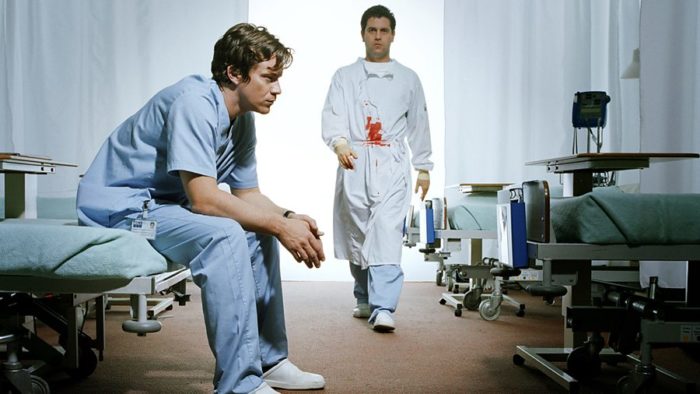Why Jed Mercurio’s Bodies should be your next box set
Review Overview
Body horror
10Institutionalised incompetence
10Confidence in medical professionals
3Helen Archer | On 06, May 2019
Let’s just get this out of the way before we begin: Jed Mercurio’s Bodies is not for the faint-hearted. There is blood – a lot of it. The gore is visceral. It is an all-too-believable body horror, filled with dead babies and women bleeding to death as doctors stand by helplessly. It is to Casualty what Line of Duty is to The Bill: although they operate on the same general plane, you are as unlikely to watch someone’s uterus being pulled out of their vagina on Casualty as you are to watch a character’s throat being cut on The Bill. It is full of sights you can’t unsee, and some of the scenes will put people off childbirth for life. But if you think you can bear it, you shouldn’t miss it.
A former doctor, Mercurio drew from his medical background for his first few writing projects. Under a pseudonym, he started scriptwriting for Cardiac Arrest, then went on to write the novel Bodies, published in 2002, before adapting it for TV. It’s a dark exposé of the politics of the NHS and the inner workings of a hospital. The programme is now over a decade old – the first series was released in 2004, then a second in 2005, before a feature-length finale was screened in 2006 – and yet it feels as urgent and as shocking now as it did back then. Slightly terrifyingly, Mercurio tweeted that it is “regrettable its portrayal of NHS politics is still relevant today.”
In Bodies, you can see where the seeds for his famous police procedural are planted, and where his interest in anti-corruption first blossomed. Bodies, like Line of Duty, is concerned with rotten apples and institutionalised malfeasance, and, as with Line of Duty, it features career-best performances from many of its actors. We follow junior doctor Rob Lake (Max Beesley), as he starts his first job at South Central Infirmary’s Obstetrics and Gynaecology ward. Working under the acclaimed Dr Roger Hurley (Patrick Baladi), he soon discovers that while his boss is good at public speaking and pulling research money into the hospital, on a practical level, he is completely out of his depth. It’s something of an open secret within the department, but Lake’s got a front-row seat, witnessing the various incidents of Hurley’s incompetence first-hand.
Keith Allen plays surgeon Tony Whitman, a role he seems born for – Whitman is arrogant, smug, superior and completely amoral. He and Hurley are locked in competition – with each other, but also with the hospital management, who demand targets are met, with no regard for how that will affect the treatment of the patients. The top doctors try to pass on patients with little chance of survival to each other, all the better to lessen the chances of it impacting their own monthly mortality rates. Susan Lynch as anaesthetist Dr Maria Norton is ready to blow the whistle, but finds herself hung out to dry by an uncaring administration, while Neve McIntosh plays Donna Rix, the hospital’s Head Sister who is more capable than the doctors she must obey. Some light relief is provided by Tamzin Malleson’s Dr Polly Grey, who follows patients and staff around, relentlessly asking them intimate questions for her ongoing female sexual dysfunction drugs trial.
If this was written by someone else, Whitman would be the villain of the piece, but nothing is so black and white in Mercurio’s world. Hurley, though ostensibly a ‘decent’ man, is hoist by his weakness of character as well as his ineptitude – for all that Whitman is an appalling human being, at least he knows how to do his job. And the nurses aren’t much better than the doctors – their careless mistakes and corner-cutting can have equally deadly repercussions, while the gallows humour at the expense of the patients is pretty much universal – the constant fat-shaming, for example, is shocking and yet simultaneously feels all-too-believeable.
The first season is tight at six episodes, while the second is looser, and, at some stages, just seems like one grim operation after another. Unlike our favourite American medical dramas, there is no swelling of classical music as medical miracles are performed in highly ordered surgical environments- here, umbilical cords are carelessly torn asunder to the tinny background tones of Toploader. The emotional punch lessens as time goes on, and the patients seem more and more like slabs of meat on the table – just bodies. And yet even with this numbing effect, Bodies does prove that there is nothing more emotionally rendering than the sight of a dead baby.
This is dark stuff, indeed, painting an extremely unflattering picture of the NHS, one mired in malpractice and incompetence, with whistleblowers being hung out to dry and patients constantly dehumanised for the sake of ‘targets’. Justice for the people who have lost their lives at the hands of professionals not up to the job is non-existent, and the same mistakes are made over and over again. It all makes for a relentlessly bleak box set, yet, while much of it is watched through your fingers, it is compellingly addictive. We tend to put our trust in doctors, aided by heroic fictional depictions of them, but Bodies posits the question – What if the doctor treating you is filled with human failings and has absolutely no idea what they’re doing? What if those in the caring professions don’t actually care?




















